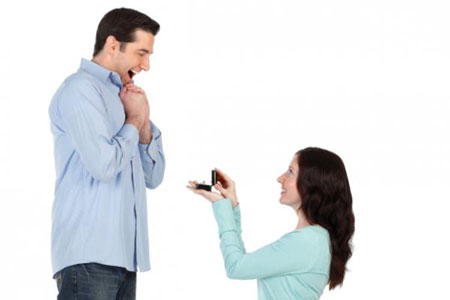 |
|
We're not likely to see greater acceptance of these proposals anytime soon. |
|
Leap year marriage proposals — where, by custom, women are granted the once-in-four-years privilege of proposing to their beaus — hold the promise of giving women real power in their relationships, but ultimately, they actually undermine women and reinforce long-standing stereotypes about traditional roles, a new paper concludes. And after examining a century's worth of evidence of societal views of women who propose marriage, the research concludes that we're not likely to see greater acceptance of these proposals anytime soon. "Women have made tremendous advances in many aspects of their lives, but in courtship, this penultimate act is still not valued or respected," said researcher Katherine Parkin, a professor at Monmouth University in New Jersey. Parkin's article was published in the January issue of the journal Family History. In her research, Parkin pored over references to leap year proposals in postcards, advertisements and newspaper columns dating back to 1904. The evidence she found suggests that the proposals have always been fairly unusual, and their rarity and the attention given to them has only underscored the idea that in society's view, men should be the ones to initiate marriage. Leap year proposals are the exception that proves the rule. The custom has really been only a "safety valve" for women's frustrations at being dependent on men, Parkin said. The tradition gives women a supposedly "acceptable" chance to propose, but this chance is given only once every four years, and even then, their right to ask a man to marry has not been taken very seriously. In fact, Parkin said she was surprised by the "incredible nastiness" toward women in postcards created in the early 20th century. Sending postcards was the craze back then, and leap year postcards depicted women — usually unattractive older women — holding guns to men's head in efforts to extract a promise of marriage. "They really disparaged women in ways that are cruel and heartbreaking," Parkin said. Her research showed that women who propose seem to lose a bit of their femininity, in the traditional way it is viewed, and likewise men who accept a proposal lose a bit of their masculinity. Even today, women who propose are the exception, Parkin said, pointing to the example of pop star Britney Spears proposing to then-boyfriend Kevin Federline. "Very few women have the wealth and power of someone like Spears, and her short, troubled marriage, as well as her struggles with her mental health, only make it less likely that other women would want to emulate her," Parkin said. (Read by Emily Cheng. Emily Cheng is a journalist at the China Daily Website.) (Agencies) |
传统上讲,女性在闰年可以向自己的心上人求婚,这可是四年一遇的难得机会,而且有望使女性在恋爱关系中拥有实权,但最新研究表明,闰年求婚从本质上讲对女性不利,并会强化人们对传统男女角色的长期刻板印象。 在研究了一个世纪以来对求婚女性的社会观念的证据后,研究人员得出结论称,人们对女性求婚的接受程度近期不会有所提高。 美国新泽西州孟茅斯大学的研究员、凯瑟琳•帕金教授说:“女性在生活的很多方面都取得了巨大进步,但对求婚而言,这种退而求其次的行为仍然被认为毫无意义,也不受尊重。” 帕金的这篇文章发表在一月份的《家庭史》期刊上。 在她的研究中,帕金集中参考了1904年以来明信片、广告、新闻专栏中提到的女性闰年求婚。 她发现的证据表明,女性求婚一直非常少见,而且其罕见性和人们给予它的关注强化了应该是男性求婚这种社会观念。女性求婚是种例外恰恰证明了这一点。 帕金说,女性在闰年求婚这种习俗实际上仅仅是女性依赖于男性这种挫败感的“安全门”。这种习俗似乎给了女性一个“可接受”的机会去求婚,而且四年才有这样一次机会,但即使这样,人们对女性求婚的态度也不是很认真。 事实上,帕金说自己看到20世纪早期的明信片对女性的“难以置信的恶意”时非常惊讶。在当时,邮寄明信片还很时尚,但闰年的明信片把女性,通常是没有姿色的老女人,描绘成拿枪顶着男人的脑袋逼婚的样子。帕金说:“人们以残忍和令人心碎的方式污蔑女性。” 她的研究表明,按传统观点来看,求婚的女性似乎缺少了一些柔美,同样,接受求婚的男性也少了几分阳刚之气。 帕金说,如今女性求婚也是特例,她还以流行歌手布兰妮•斯皮尔斯曾向当时的男友凯文•费德林求婚为例。她说:“很少有女性拥有布兰妮的财富和权力。但她的婚姻很快结束而且麻烦不断,加之她总是受心理问题的困扰,这也只会使其他女性更不愿效仿她。” 相关阅读 (中国日报网英语点津 Julie 编辑:陈丹妮) |
|
Vocabulary: leap year: 闰年 beau: 男朋友,情郎 penultimate: 倒数第二的 pore over: 集中精神阅读,注视 |
